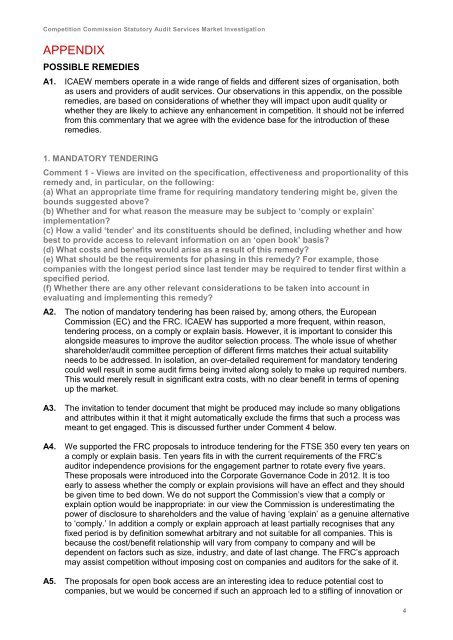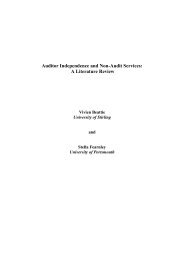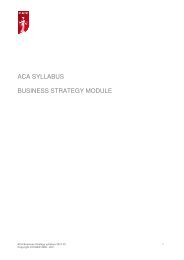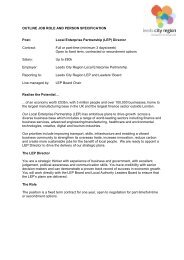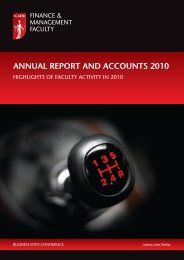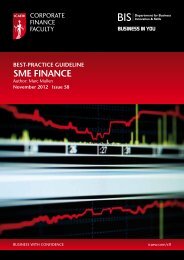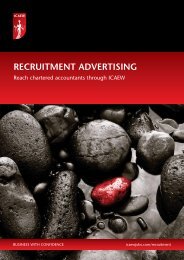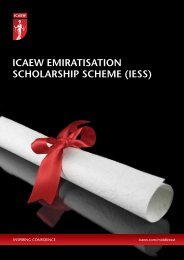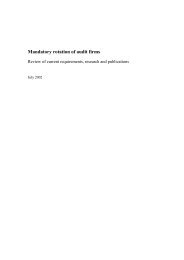ICAEW REP 46/13 Competition Commission Statutory Audit ...
ICAEW REP 46/13 Competition Commission Statutory Audit ...
ICAEW REP 46/13 Competition Commission Statutory Audit ...
You also want an ePaper? Increase the reach of your titles
YUMPU automatically turns print PDFs into web optimized ePapers that Google loves.
<strong>Competition</strong> <strong>Commission</strong> <strong>Statutory</strong> <strong>Audit</strong> Services Market InvestigationAPPENDIXPOSSIBLE REMEDIESA1. <strong>ICAEW</strong> members operate in a wide range of fields and different sizes of organisation, bothas users and providers of audit services. Our observations in this appendix, on the possibleremedies, are based on considerations of whether they will impact upon audit quality orwhether they are likely to achieve any enhancement in competition. It should not be inferredfrom this commentary that we agree with the evidence base for the introduction of theseremedies.1. MANDATORY TENDERINGComment 1 - Views are invited on the specification, effectiveness and proportionality of thisremedy and, in particular, on the following:(a) What an appropriate time frame for requiring mandatory tendering might be, given thebounds suggested above?(b) Whether and for what reason the measure may be subject to ‘comply or explain’implementation?(c) How a valid ‘tender’ and its constituents should be defined, including whether and howbest to provide access to relevant information on an ‘open book’ basis?(d) What costs and benefits would arise as a result of this remedy?(e) What should be the requirements for phasing in this remedy? For example, thosecompanies with the longest period since last tender may be required to tender first within aspecified period.(f) Whether there are any other relevant considerations to be taken into account inevaluating and implementing this remedy?A2. The notion of mandatory tendering has been raised by, among others, the European<strong>Commission</strong> (EC) and the FRC. <strong>ICAEW</strong> has supported a more frequent, within reason,tendering process, on a comply or explain basis. However, it is important to consider thisalongside measures to improve the auditor selection process. The whole issue of whethershareholder/audit committee perception of different firms matches their actual suitabilityneeds to be addressed. In isolation, an over-detailed requirement for mandatory tenderingcould well result in some audit firms being invited along solely to make up required numbers.This would merely result in significant extra costs, with no clear benefit in terms of openingup the market.A3. The invitation to tender document that might be produced may include so many obligationsand attributes within it that it might automatically exclude the firms that such a process wasmeant to get engaged. This is discussed further under Comment 4 below.A4. We supported the FRC proposals to introduce tendering for the FTSE 350 every ten years ona comply or explain basis. Ten years fits in with the current requirements of the FRC’sauditor independence provisions for the engagement partner to rotate every five years.These proposals were introduced into the Corporate Governance Code in 2012. It is tooearly to assess whether the comply or explain provisions will have an effect and they shouldbe given time to bed down. We do not support the <strong>Commission</strong>’s view that a comply orexplain option would be inappropriate: in our view the <strong>Commission</strong> is underestimating thepower of disclosure to shareholders and the value of having ‘explain’ as a genuine alternativeto ‘comply.’ In addition a comply or explain approach at least partially recognises that anyfixed period is by definition somewhat arbitrary and not suitable for all companies. This isbecause the cost/benefit relationship will vary from company to company and will bedependent on factors such as size, industry, and date of last change. The FRC’s approachmay assist competition without imposing cost on companies and auditors for the sake of it.A5. The proposals for open book access are an interesting idea to reduce potential cost tocompanies, but we would be concerned if such an approach led to a stifling of innovation or4


